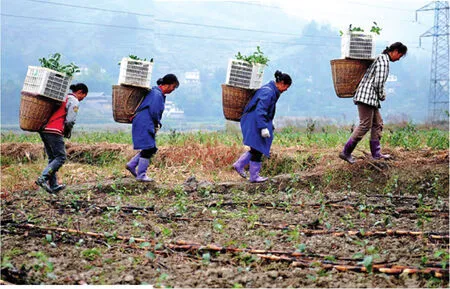Dealing With Loneliness Suicidal tragedies bring to light the plight of left-behind women in China By Wang Hairong
Dealing With Loneliness Suicidal tragedies bring to light the plight of left-behind women in China By Wang Hairong
The desperate yell of a 13-year-old boy broke the silence of Dongfeng Village in Liangping County, southwest China’s Chongqing Municipality, shortly before midnight on April 2. “Help, mother is hacking us with a knife,” the boy shouted.
Villager Zhu Chuanhong was woken up by hasty pounding at his door. He opened the door, and was shocked to see the boy, nicknamed Xiaoyou, bleeding profusely from injuries to his head and face.
Xiaoyou told Zhu that he was sleeping at home, but suddenly felt an acute pain. He woke up and saw his mother stabbing at him and his younger brother with a knife. He broke away and ran for help.
Zhu and the other villagers rushed to Xiaoyou’s home to rescue his 11-year-old brother Xiaoyi. But when they entered the house they did not see the mother or the son, but saw pools of blood on the foor and on the bed sheets. Half an hour later, the villagers found the mortally injured Xiaoyi lying in a ditch.
The two boys were sent to the hospital. Yet upon arrival at the hospital, the older boy died from excessive loss of blood. The younger one survived with about 80 cuts to his head and 20 to his limbs.
Four days later, the mother’s body was retrieved from a river. She had taken her own life. The woman, Zheng Xiuwei, 37, lived with her two sons in the village, while her husband Zhu Jiawen, 41, worked in east China’s Anhui Province, more than 1,200 km from Chongqing.
Deng Qingshun, Zheng’s uncle-in-law, suspected that Zheng had gone insane. He said that Zheng was usually taciturn, and often stared expressionlessly or shouted names without reason.
After the tragedy, Zhu Jiawen returned home. He said that his wife usually treated their sons well, and the couple was on good terms, though she was introverted and did not like to socialize with others.
According to Zhu, he had taken her to see a doctor, but the doctor said he saw no signs of any psychological disorder.
Zhu said that several days before the incident his wife called him, telling him that she was suffering from a gynecological disorder and asked him to return home. “I told her to go to hospital and have a medical examination by herself. I did not expect this would happen,” Zhu said.
Overloaded women
Zheng’s case is one of two gruesome suicidemurders that have recently shocked people in China.
The other case took place on March 27 and involved a 27-year-old mother, Tang Chengfang, in southwest China’s Sichuan Province. The mother poisoned her three children with pesticides and then attempted to commit suicide by drinking the same chemical. When this happened, Tang’s husband was working in coastal Fujian Province while Tang was taking care of the children in their hometown. The mother and all of her three children are still in the hospital.
Both mothers are “left-behind women,” a term referring to women who stay in their rural hometowns while their husbands work as migrant workers in cities. The two tragic cases have brought the living conditions of these women to the public’s attention.
Official statistics released in May 2011 showed that China had more than 240 million migrant workers.
While many rural men are working hard to make a living in cities, their wives back home are often left with the task of taking care of children, the elderly, livestock and crops.
Left-behind women are confronted with many social and psychological issues.Dancing Solo: Women Left Behind in Rural China, published in 2009, depicted some major problems that left-behind women encounter in daily life.
The book was co-authored by Wu Huifang, a researcher with the College of Humanities and Development at China Agricultural University, and Ye Jingzhong, a professor at the university. For this study, the researchers interviewed hundreds of leftbehind women in Anhui, Jiangxi, Hunan, Henan and Sichuan provinces, which are major sources of migrant workers in China.
The researchers found that 92.4 percent of the women surveyed handled both housework and farming, while 35.5 percent took care of two children or more. More than half of them reported that they were unable to handle all the feldwork and therefore had to seek help from other people.

GROUP WORK: Left-behind women in a support group in Zhangtang Village, Xinfeng County in central China’s Jiangxi Province, help each other in the feld
ZHOU KE
One of the women Wu met in Sichuan during a site study was a 43-year-old and had been married for 20 years. Ever since their marriage, her husband had spent most of his time working on construction sites in major cities. In addition to taking care of the child and elderly at home, the woman managed two large mushroom greenhouses, fed silkworms and grew rapeseed and rice on two patches of land.
These women commonly suffer from loneliness. The husbands of 66.7 percent of the women surveyed were not at home for most of the year. A little over half of these husbands left their hometowns more than 10 years ago, and most only returned to visit once a year.
These left-behind women said that during busy agricultural seasons, they were overwhelmed by the heavy workload. As a result, 69.8 percent of the women surveyed said they often felt agitated, and 50.6 percent experienced anxiety, while 39 percent often felt depressed.
Some women told researchers that when they felt exhausted and depressed, they vented their anger on their children, and sometimes physically or verbally abused them.
The study also found that about 8.3 percent of left-behind women had also experienced a marriage crisis or divorce. Among these women, some could no longer endure the loneliness and left their husbands, while others were jilted by their husbands for a new woman in the city.
Mutual help
To solve problems facing left-behind women, support groups have been established across China. So far, women’s organizations across the country have helped set up 221,200 such groups, according to China National Radio.
Support groups in Taiping Village in Qingxi Township, Hanshan City in Anhui, were set up in the autumn of 2002. Their founder Wang Zilian appeared on a program on national broadcaster CCTV in March to share her experience with a national audience.
Taiping Village has 2,598 residents in 720 households. More than 800 people worked away from their hometown, leaving 260 leftbehind women, including Wang.
Wang said that she hit upon the idea of establishing a mutual support organization in 2002 when she found many left-behind women worrying about how to harvest rice and take care of their young children at the same time.
“If left-behind women can work together and divide work, the rice can be harvested more effciently and the children can be taken better care of,” Wang said.
Within the mutual support organization created by Wang, seven to eight left-behind women form a support group, with one member assigned to cook and take care of children and the elderly, and other members working in the feld.
Rong Liangmei, a left-behind woman, used to cultivate 0.13 hectares of rice by herself. When the rice was ripe, if her husband could not return from the city, she had to hire workers. Now, the six members in her support group can get the rice cut within a day, while they also have a chance to chat with each other.
Ding Yihong is very happy with the mutual support organization. In 2001, since her family did not have enough labor to harvest rice before a heavy rain storm, half a ton of rice ended up rotten in the field. Once she joined a support group, this has not happened again.
The support groups also give left-behind women a platform to communicate about their feelings and experiences in educating their children and in handling family affairs. Sometimes, members also watch entertainment programs together.
Group members also often talk about how to get rich. Ling Meimei is good at raising pigs. She has raised more than 10 sows and scores of pigs at home. She hopes to teach other group members to raise pigs.
Chai Daoju runs a chicken farm in the mountains. Last year, the farm sold more than 3,000 chickens. This year, she plans to work with members of her group to expand the chicken farm.
wanghairong@bjreview.com

